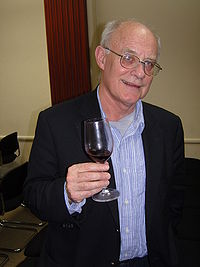Angus Macintyre Scientist
Angus John Macintyre FRS, FRSE (born 1941) is a British mathematician and logician who has made fundamental and widely influential contributions to Model theory, logic and their applications in algebra, algebraic geometry, and number theory.After undergraduate studies in Cambridge University, he completed his PhD at Stanford University under the supervision of Dana Scott in 1968. From 1973 to 1985, he was Professor of Mathematics at Yale University. From 1985 to 1999, Professor of Mathematical Logic at the University of Oxford and Professorial Fellow of Merton College, Oxford. From 1999 until 2002, he was Professory of Mathematics at the University of Edinburgh.Since 2002, he has been Professor of Mathematics at Queen Mary.Macintyre was the first Scientific Director of the International Centre for Mathematical Sciences (ICMS) in Edinburgh. He was elected a Fellow of the Royal Society in 1993. In 2003, he was awarded the Pólya Prize by the London Mathematical Society. From 2009 to 2011, he was President of the London Mathematical Society (LMS).Macintyre's papers from 1971 on Aleph-one categorical theories of groups and fields created paradigms of research and new fields of study in model theory and its applications to areas of mathematics, and were also influential in the development of geometric stability theory. His works on model theory of various structures related to algebra, geometry and number theory have been widely influential. His work in 1976 on quantifier elimination for p-adic fields created a theory of p-adic semi-algebraic geometry and was a major contribution to model theory of valued fields in continuation of works of James Ax and Simon Kochen and Paul Cohen, and has had celebrated applications to arithmetic geometry and motivic integration, including solution by Jan Denef to a conjecture of Jean-Pierre Serre on rationality of p-adic Poincaré series. These works have been of importance in the development and applications of the theory of integration on local fields and the theory of motivic integration by Jan Denef and Francois Loeser among others.Macintyre's work with Zoe Chatzidakis and Lou van den Dries developed the model theory of finite and pseudo-finite fields pioneered by James Ax, and generalized the Lang-Weil estimates (of Serge Lang and Andre Weil) over finite fields to definable sets. This result could find several applcations, to name a few, model theory of finite and asymptotic structures, simple theories and in bounds for exponential sums in analytic number theory.Macintyre introduced the model theory of difference fields (which has become a widely studied subject) and proved the first model-theoretic results on these structures. He proved the first results on the model theory of Frobenius automorphisms. He gave a model theory for intersection theory and related it to Alexander Grothendieck's standard conjectures on algebraic cycles.Macintyre is one of the pioneers of the model theory of real and complex exponentiation. With Alex Wilkie he proved the decidability of real exponential fields (solving a problem of Alfred Tarski) modulo Schanuel's conjecture from transcendental number theory. With Lou van den Dries he initiated the model theory of logarithmic-exponential series and Hardy fields. His work with David Marker and Lou van den Dries gave fundamental results on the model theory of restricted analytic functions and exponentiation and O-minimality.Macintyre has worked on Zilber's theory of the complex exponentiation and Zilber's pseudo-exponential fields. Macintyre's work with Jamshid Derakhshan develops a model theory for the adele ring of a number field which is of importance in number theory. With Marek Karpinski, he proved decisive results on VC-dimention which has had applications to theoretical computer science and neural networks.
Search
Scientist
| awards | |
|---|---|
| doctoral advisor |
